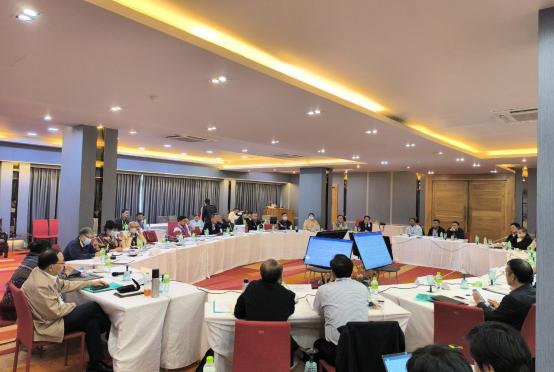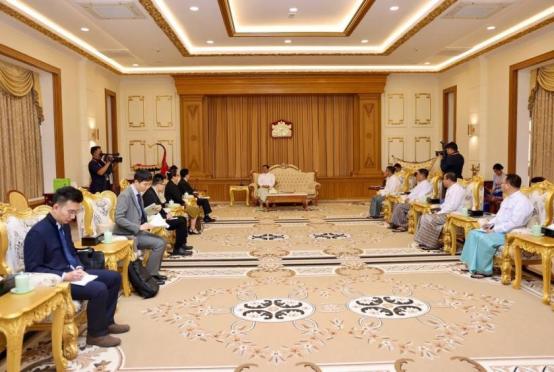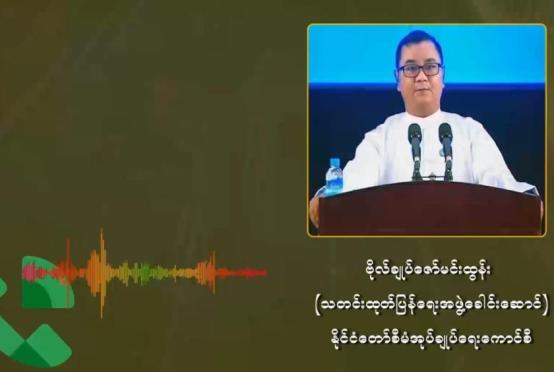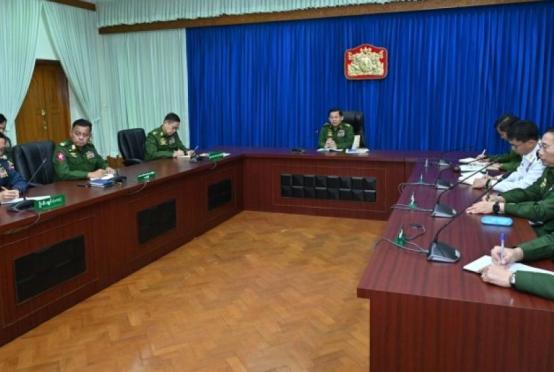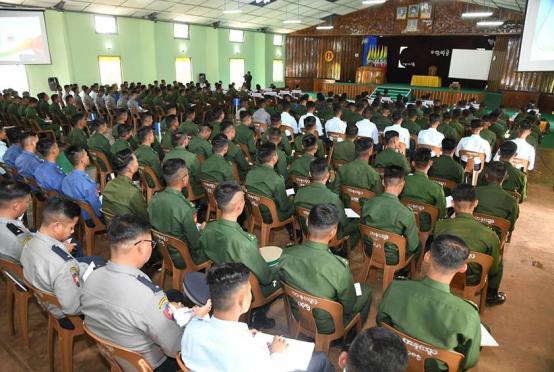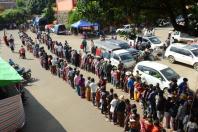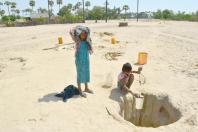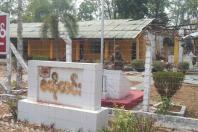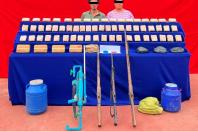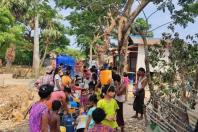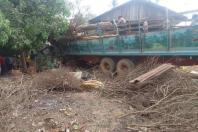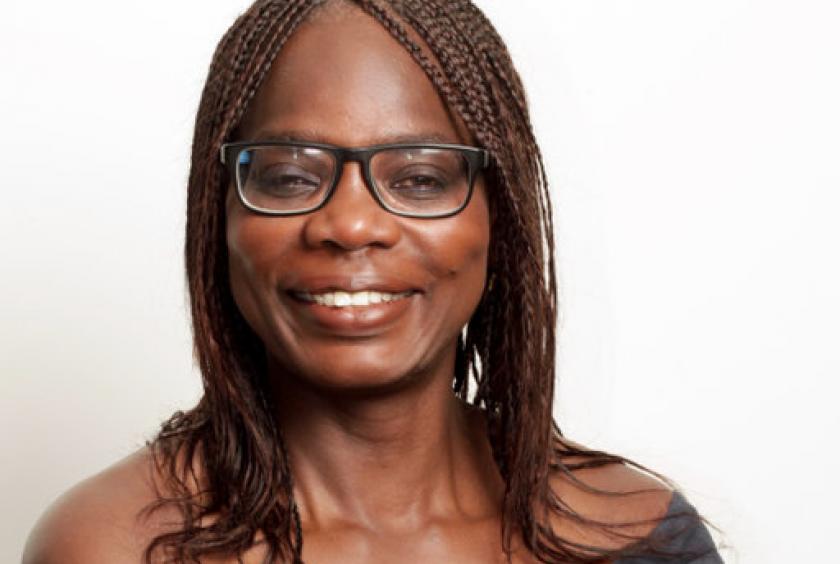
Myanmar defended on December 11, 2019 at the International Court of Justice (ICJ) located at The Hague, Netherlands in the genocide trial initiated by The Gambia.
The following is the full transcription, as provided by the ICJ website's full verbatim record, of Lawyer Pheobe Okowa.
LACK OF REAL AND IMMINENT RISK OF IRREPARABLE PREJUDICE TO THE RIGHTS IN DISPUTE
LACK OF REAL RISK OF IRREPARABLE PREJUDICE TO SPECIFIC RIGHTS AND LACK OF URGENCY
A. Introduction
1. Mr. President, Madam Vice-President, Members of the Court, I appear before the Court for the first time. It is a great honour for me to do so on behalf of the Union of Myanmar.
2. I will address you on the last of the prerequisites for the indication of provisional measures, namely the requirement that there must be a real and imminent risk of irreparable prejudice to the rights in dispute before the Court gives its final decision. In four cases in which a request for provisional measures was not granted, the applicant State had failed to demonstrate urgency of the measures sought. We argue that notwithstanding what you heard from Mr. Reichler yesterday, the case for ordering provisional measures in this case is not blindingly obvious. We argue that The Gambia’s request fails to meet the threshold for provisional measures as developed in the Court’s jurisprudence and fails to satisfy the requirement of urgency.
3. I will develop four points in these submissions:
(a) The first is that in order to meet the final requirement, The Gambia needs to satisfy the Court that there is a real and imminent risk of Myanmar committing breaches of the Genocide
Convention prior to the conclusion of these proceedings.
(b) Secondly, the current situation in Myanmar is inconsistent with the existence of an imminent risk of genocide. Myanmar is currently engaged in repatriation initiatives to support the return of displaced persons presently in Bangladesh. These have the support of a range of regional and international actors, support which would not be forthcoming if there was there an imminent or ongoing risk of genocide.
(c) Thirdly, Myanmar is currently engaged in a range of initiatives aimed at bringing stability to Rakhine State, protecting those who are there or who will return there, and bringing to account
those responsible for past violence, actions which are inconsistent with it harbouring genocidal intent, as alleged by The Gambia yesterday.
(d) Finally, The Gambia has failed to provide any evidence to support its claim that the recent instability in Rakhine State is attributable to Myanmar and fails to acknowledge the role of
insurgent groups in the region.
B. Legal principles relevant to provisional measures
4. I will now turn to the legal principles relevant to provisional measures. The requirements
of irreparable prejudice and urgency are well established in the Court’s jurisprudence. However, it is useful to make two brief observations on how these principles apply to The Gambia’s request.
5. The first is that provisional measures are indicated only where there is a risk that irreparable prejudice could be caused to the rights sub judice180. The Court would therefore need to be satisfied that there is a real and imminent risk of Myanmar committing breaches of the Genocide Convention prior to the conclusion of these proceedings. All this, of course, is assuming that the Court is satisfied that it has jurisdiction, that The Gambia has standing to bring this claim and that there is a plausible case that breaches of the Genocide Convention might occur which for the reasons given by Professor Schabas and Mr. Staker is not the case.
6. The second is that provisional measures are concerned with future threats, not past events. The Court must be satisfied that there exists today a real and imminent risk of irreparable prejudice to the claimed right.
C. The application of the legal principles in the circumstances of this case
7. I turn now to address the application of these principles in the circumstances of the case at hand. There are four submissions that I would like to develop in that regard. 8. My first point goes to urgency. The decision to launch these proceedings was taken as early as March 2019182. The Application was then filed as late as November 2019, more than half a year later. So, was there something that happened in November or October that made them “urgent”? If The Gambia really believed that there was an urgent need to protect, would it not have shown greater diligence in bringing its case and its request for provisional measures? The Gambia’s request fails to advance a change in circumstances necessitating this application.
9. The second submission is that a number of regional and international actors are currently supporting the repatriation to Rakhine State of displaced persons currently in Bangladesh. (a) The United Nations High Commission for Refugees (UNHCR) has been at the forefront of supporting repatriation efforts. Together with the United Nations Development Programme (UNDP), it entered into a Memorandum of Understanding (MoU) with Myanmar regarding the repatriation process in June 2018. In May of this year, the MoU was extended until 5 June 2020 and in August, the UNCHR confirmed its continuing support for the repatriation effort. The UNDP and the UNHCR are currently implementing a total of 43 “quick impact projects” in Rakhine State186. As part of a confidence building exercise we know that senior officials from Myanmar have met with displaced persons in Bangladesh with the support of the United Nations High Commission for Refugees187. Mr. President, Members of the Court, it is improbable to say the least that the United Nations High Commission for Refugees an organization with eyes and ears on the ground would be facilitating meetings between displaced persons with a view to their repatriation to Myanmar . . .
Mr. President, Members of the Court, it is improbable to say the least that the United Nations High Commission for Refugees an organization with eyes and ears on the ground would be facilitating meetings between displaced persons with a view to their repatriation to Myanmar if there were any reason to believe that those who would return are at imminent risk of genocide. The unequivocal and continuing support of both, UNHCR and UNDP for Myanmar’s repatriation programme cannot be reconciled with the suggestion of such a risk.
(b) What is more, in November this year, the Association of Southeast Asian Nations (ASEAN) expressed their support for a “more visible and enhanced presence and enhanced role for ASEAN to support Myanmar in providing humanitarian assistance, in facilitating the repatriation process and promoting sustainable development of Rakhine State”. This was the position reached following the deployment of the ASEAN Emergency Response and Assessment Team (ASEAN-ERAT) from Indonesia, Malaysia, Singapore and Thailand to Myanmar in March 2019 to assess the readiness of the transit and reception centres. In their assessment, ASEAN team found that systems prepared by the Myanmar Government for the repatriation of returnees are all in place and operational, noting that “it is evident that significant efforts have been made by the Government of Myanmar to facilitate a smooth repatriation process”.
(c) Bangladesh, the country that has borne the brunt of the crisis, has also entered into a MoU with Myanmar to provide an organized framework for repatriation of displaced persons. Under the Memorandum, there shall be “no restrictions on the number of persons to be repatriated, as long as they can establish bona fide evidence of their residence in Myanmar”192. This is proof of the fact that Bangladesh, as Myanmar’s close neighbour, is not of the view that Muslims are at risk of imminent genocide should they return.
(d) Mr. President, Members of the Court, neighbouring States have also provided practical support for the repatriation effort. For example, in February of this year, China donated 20 trucks to the Committee on Repatriation and Resettlement of Displaced People194 and Japan provided US$ 37 million to cover the humanitarian and development projects in Rakhine State throughout 2019
(e) At a meeting on 4 November 2019 between India’s Prime Minister Narendra Modi and Myanmar’s State Counsellor, Mr. Modi confirmed his unequivocal support for the repatriation of refugees from Bangladesh as being in the best interests of the three neighbouring States.
(f) In November 2019, the United Nations Secretary-General’s Special Envoy to Myanmar, Christine Shraner-Burgener met with government officials of Myanmar and discussed, amongst other things, the return of the displaced persons and the potential use of third-party mediation to reduce the fighting in Rakhine State197. Mr. President, Members of the Court, these arrangements are repeatedly referred to by these agencies as the only uncontested solution to the humanitarian crisis in Rakhine State.
10. It is true that few displaced persons have returned. A number of factors may account for this. There is the continuing insurgency in Rakhine between Myanmar’s armed forces and the Arakan Army. Secondly, the displaced Muslim residents of Rakhine have made their return conditional on a number of demands including the grant of full citizenship, their recognition as a distinct ethnic group, return of land and compensation for past injustices. These demands sit uneasily with the suggestion that they are at risk of imminent death. Both the requirements of citizenship and ethnicity remain contested and as yet there is no consensus on the issue. There is no doubt that instability is deterring many from returning. But and this is significant it is a concern shared by displaced persons of a number of ethnicities. The fact is that the insurgency in Rakhine State has led to the displacement of people of varied ethnic and religious backgrounds, including ethnic Buddhist Rakhine, Hindus and Muslims. It is not the case that the region is dangerous for Muslims but safe for other ethnic groups200. Yet you heard not one word yesterday about the plight of other communities in Rakhine.
11. The key point is that the support for these repatriation initiatives from these sources and the broader international community201 evidences a shared understanding that their return does not present imminent danger; and is obviously inconsistent with the existence of an imminent risk of genocide occurring in Myanmar.
12. The third point that tells against the existence of any imminent risk of genocide is that Myanmar is currently engaged in a wide range of initiatives aimed at bringing stability to Rakhine province, protecting those who are there or who return there, and bringing to account those responsible for past violence. It is not possible in the short time available to provide a comprehensive list of the actions which Myanmar has taken so far. I will confine myself to highlighting initiatives taken in two key areas.
13. First, Myanmar has taken a full range of initiatives to improve the overall stability and enhance the development of Rakhine State. These have included the establishment of the Central Committee on the Implementation of Peace, Stability and Development of Rakhine State, led by the State Counsellor, Myanmar’s Agent in these proceedings202; the Rakhine State Investment Committee, tasked with enabling local communities to derive benefit from investment as well as to promote participation by the local population203; the Committee for Supporting Peace and Stability in Rakhine204; and, the Advisory Commission on the Rakhine State, then chaired by the late United Nations Secretary-General Kofi Annan, to advise on how best to achieve stability, development and meaningful coexistence between the different groups in Rakhine province. In a recent report, progress was recorded in implementing recommendations by the Commission. This included significant investment in transport infrastructure, with the construction of nine industrial roads nearing completion and 49 bridges in progress, as well as the implementation of 100 new houses for the relocation of Taung Paw Internally Displaced Persons’ camp.
14. Secondly, the Government of Myanmar has undertaken several initiatives to investigate the violence that occurred since the regrettable events of 2016 and 2017. This has included: (a) The establishment (in December 2016) of the Investigation Commission on Maungdaw to probe into the background causes of the attacks on 9 October and 12 to 13 September 2016; (b) In January 2018, a military court established in Mansi Township sentenced six soldiers to ten years imprisonment for their role in the killing of three men; (c) The establishment (in July 2018) of the Independent Commission of Enquiry (ICOE) to investigate the allegations of human rights violations and related issues in Rakhine State;also worth noting.
(d) We also have the establishment (in March 2019) of a Military Court of Inquiry to investigate incidents related to the terrorist attacks which occurred in Buthidaung-Maungdaw region. The Court of Inquiry has conducted investigations in Buthidaung and Maungdaw townships. On 25 November 2019, it was announced that the military court will begin court martial proceedings against a group of soldiers involved in fighting against the Arkan Rohingya Salvation Army in Gu Dar Pyin village, in Buthidaung township. Regional and international bodies, including the Association of Southeast Asian Nations, have expressed support for thesemeasures aimed at accountability.
15. Mr. President, Members of the Court, these initiatives, as well as the international effort to repatriate displaced peoples, are completely at odds with the case presented by The Gambia. If The Gambia’s allegations were to be taken at face value, it would have to follow that in all of the aforementioned initiatives, Myanmar is acting in bad faith, participating in all these initiatives, whilst in truth harbouring an entirely inconsistent genocidal intent. Such bad faith on the part of a State cannot be assumed by the Court, even at the provisional measures stage, in the absence of sound evidential basis to that effect.
16. Turning to The Gambia’s case213, it is worth noting what is omitted from the portrayal of the current situation-no doubt quite deliberately. Conspicuously absent is any acknowledgment of the complexity of the situation in Rakhine State. There is no mention of the ongoing insurgency in Rakhine by militant Muslim groups (Arakan Rohingya Salvation Army (ARSA)) and separatist Rakhine groups, like the Arakan Army (AA), opposed to the union with Myanmar214. Significantly, The Gambia does not cite any material which conclusively attributes recent attacks against homes and villages to the organs of the State of Myanmar. What is more, no State in the region, not even Bangladesh, has asserted that the displaced persons, if returning to Myanmar, would be at risk of genocide.
17. For example, the International Crisis Group in its most recent report noted the role of the ethnic armed groups, such as the Arakan Army, the separatist group excluded from the peace talks, in aggravating conflict. And just last week the Arakan Army claimed responsibility for an attack on a ferry carrying government officials.
18. Much is made in the Application217 of the alleged restrictions on the freedom of movement of Muslim groups in Rakhine, who are confined in “displacement camps” where access is strictly controlled by the Myanmar Military Police. But The Gambia does not mention that the deployment of the police is due to security considerations. It fails to indicate that these restrictions on movement have affected access of all communities, Muslims and non-Muslims alike, to education and also to health services218. In fact, a 2019 “Preliminary Needs Assessment” done by the Association of Southeast Asian Nations found that the local community in Rakhine view the presence of border guards as a critical element in rebuilding public confidence and deterring potential conflicts.
19. The allegation of a State-sponsored policy of starvation is not supported either. The Application instituting proceedings220 cites only three documents, at footnotes 197 to 198, one of which is the Fact-Finding Mission’s detailed findings merely referring to two other documents. One of these other documents does not refer to any deliberate State policy of forced starvation, but merely refers to “concerns” of people “reportedly experiencing conditions of forced starvation”.
The other is a statement by Ms Yanghee Lee, who says that there “appears” to be a policy of forced starvation in place, but does not give any further particulars.
20. The region, it is acknowledged, is facing a period of great instability. There is no doubt that this is having consequences for civilians caught up in the unrest. At Myanmar’s request the Red Cross and the Red Crescent Movement comprised of the ICRC and the Red Crescent Societies (IFRC) have been providing humanitarian assistance in Maungdaw and Sittwe districts. The World Food Programme (“WFP”) has been present with Myanmar’s support, since 2017. It is significant that the WFP, in its monthly briefings, has made no suggestion of a policy of starvation. In fact, what it reports is food shortages affecting non-Muslim ethnic groups, attributable to ongoing fighting with insurgent groups.
21. Again, the various States and organizations who are supportive of the repatriation process have not suggested that there is any State policy of starvation in place, and it is hardly likely that they would be promoting repatriation efforts if they considered that there was any such risk.
22. To summarize, the ongoing causes and consequences of the hostilities in Rakhine State are complex and difficult to disentangle. The Court is not in a position to work through the disputes of fact in the context of a provisional measure’s application. What is clear is that there is simply no evidence that the Muslim community is at risk of acts deliberately aimed at them by Myanmar’s organs at their destruction as a group “in whole or in part”.
Conclusion
23. Mr. President, Members of the Court, in our submission the request provides no factual basis for the conclusion that there is an imminent risk of Myanmar committing breaches of the Genocide Convention. On the contrary, Myanmar has made, and continues to make, great efforts to de-escalate the conflict that affects Rakhine State, and to advance peace, stability, and reconciliation in the region.
24. Myanmar’s efforts have been endorsed by the international actors at the highest level. Importantly, they are recognized by regional and international players, including China, Indonesia, and Japan, as the only realistic solution to a humanitarian crisis against the backdrop of an on-going insurgency in Rakhine.
25. It is on this note that I turn briefly to the Court’s discretion whether or not to order provisional measures, even if it considers that the criteria of Article 41 are met. In this case, there is a powerful factor that goes to discretion. To quote the late United Nations Secretary-General, Mr. Kofi Annan, speaking at the time of the publication of the Advisory Commission’s Interim Report: “the challenges facing Rakhine State and its peoples are complex and the search for lasting solutions will require determination, perseverance and trust”226. If this Court were to find that there is an imminent risk of genocide in Myanmar, it would create an immediate and insurmountable obstacle to the current repatriation efforts underway. This is a highly relevant factor for the Court to consider when determining whether or not to grant provisional measures.
26. However, I do stress again that Myanmar firmly and emphatically denies that the criteria in Article 41 are met in this case.
27. This concludes the first round of oral pleading of Myanmar. I would like to thank you very much for your kind attention.

